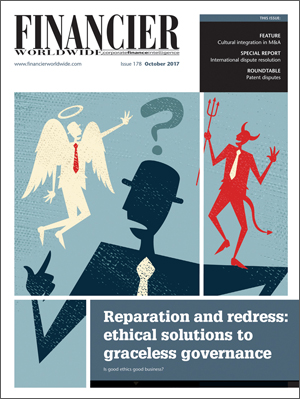Air Berlin files for bankruptcy
October 2017 | DEALFRONT | BANKRUPTCY & CORPORATE RESTRUCTURING
Financier Worldwide Magazine
Bringing to an end the story of one of Europe’s largest network airlines, Air Berlin has filed for bankruptcy following the withdrawal of financial support by its biggest shareholder, Abu Dhabi-based airline Etihad.
A beleaguered business, passenger numbers at Air Berlin have been falling for some time and in July the airline lost a quarter of its customers compared with last year. Germany’s second largest carrier has also been plagued by delays and cancellations, for which it has been forced to pay millions of euros in compensation.
Air Berlin reported an overall record loss of €782m in 2016.
The federal German government, Lufthansa (Air Berlin’s main rival) and other partners are supporting Air Berlin during insolvency proceedings and in its restructuring efforts, with the government providing a €150m bridging loan to maintain flight operations for the long term.
Air Berlin has commenced insolvency proceedings as part of the restructuring process under self-administration at the local District Court (Amtsgericht) of Berlin-Charlottenburg.
The support being provided to the airline means that all flights operated by Air Berlin and its Austrian affiliate Niki (one division of the Air Berlin Group not presently operating under bankruptcy protection) will continue as planned. The flight schedule remains valid, bookings remain valid and all flights can still be booked.
“We are working tirelessly to achieve the best possible outcome for the company, our customers and employees, given the situation,” said Thomas Winkelmann, chief executive of Air Berlin.
“The background of the announcement is the notification by Etihad that it no longer intends to provide Air Berlin with financial support.”
As one of Europe’s largest network airlines, Air Berlin focuses on regular domestic flights and on services between a number of major European cities and its Berlin-Tegel and Dusseldorf hubs, from where the airline also operates long-haul flights to the US, Caribbean and the Middle East. Air Berlin carried approximately 28.9 million passengers in 2016 and its fleet is among the most modern and eco-efficient in Europe.
As regards the acquisition of business units of Air Berlin, negotiations with Lufthansa and other partners are said to be advanced and highly promising, and expected to be finalised in the near future. Additional interested parties are believed to include Easyjet, Tuifly and Thomas Cook’s subsidiary Condor Airlines. For its part, the federal government has said that it is against a single owner deal.
Indeed, according to Mr Winkelmann, Air Berlin prefers to sell its assets to multiple buyers with the intention being to complete the sale so as not to lose the confidence of customers.
Criticism of such dealings has not been in short supply, however, with Ryanair, which has been targeting the German market, stating that there was an “obvious conspiracy” between Germany, Lufthansa and Air Berlin to carve up the assets of the bankrupt airline.
“This manufactured insolvency is clearly being set up to allow Lufthansa to take over a debt-free Air Berlin which will be in breach of all known German and EU competition rules,” said a Ryanair spokesperson. “Now even the German government is supporting this Lufthansa-led monopoly with millions of euros of state aid so that Lufthansa can acquire Air Berlin and drive domestic air fares in Germany even higher than they already are.”
In response, a German federal government spokeswoman rejected the accusation by Ryanair that Air Berlin’s was a staged insolvency application. Ryanair has now lodged a complaint with the German regulator, the Bundeskartellamt, and the European Commission (EC).
As negotiations continue surrounding Air Berlin assets, the German market is likely to be opened up to more competition.
© Financier Worldwide
BY
Fraser Tennant

